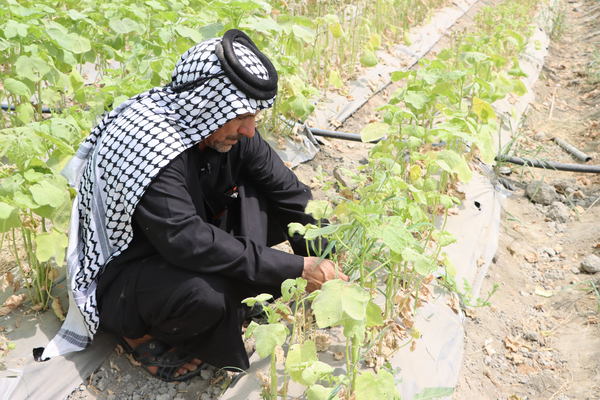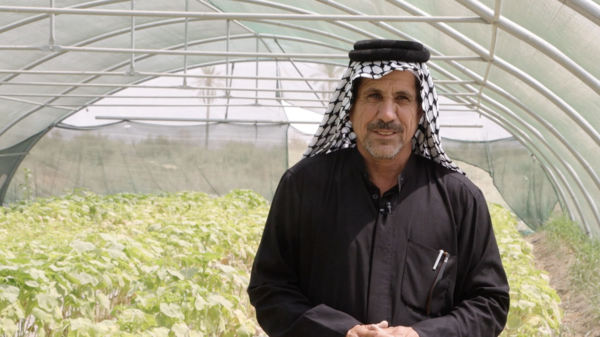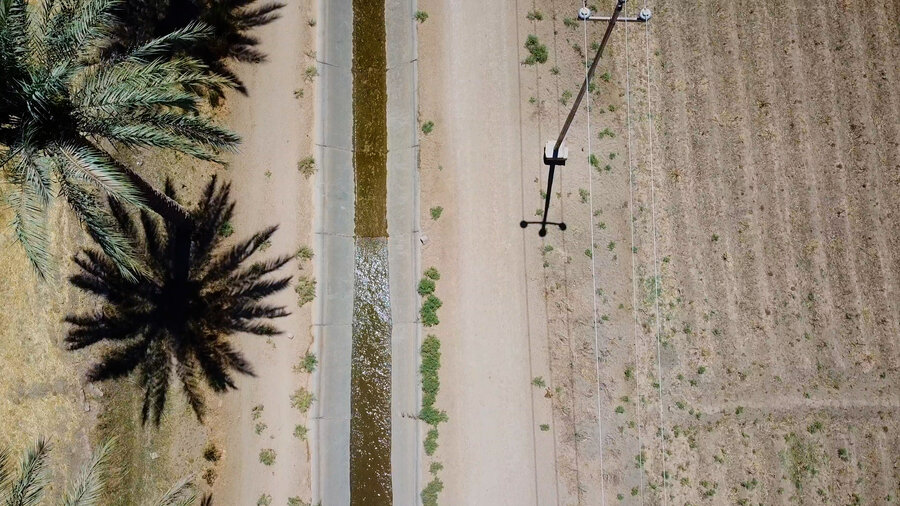How WFP empowers farmers in Iraq in the face of climate extremes
It’s almost noon on a scorching day last August – 53°C. We follow Jermal, a farmer in Basra, Iraq, on a narrow trail to his greenhouse. Our footsteps kick up dust from the cracked, sepia-toned earth. When we step inside, we’re greeted by a gust of muggy wind and the unexpected sight of row upon row of dead, dry plants.


“With this heat, our crops just can’t survive,” says Jermal, plucking dead leaves from the wilted crops and crushing them between his fingers. “I've been farming this land for over 30 years and I've never seen anything like this.”

Yellowed leaves and shriveled crops are just two signs of the heatwave that has struck Iraq – which now ranks among the top countries most seriously affected by the global climate crisis.
The south of the country has been hit the hardest. “Temperatures used to go as high as 47°C. Now they routinely exceed 50°C,” Jermal says.
In Basra, water scarcity has displaced half the population. Those who stayed behind now struggle to put food on the table.
Despite being Iraq's largest oil-producing governorate, was also home to millions of palm trees that produced dates of the highest quality in the region. These were burned away during the Iraq-Iran war in the 1980s.
The scorched earth, water scarcity, and salinity in the area made it nearly impossible to restore palm trees to their former glory. While Basra's economy depends on oil production, the more vulnerable communities rely primarily on agriculture to sustain themselves and earn a livelihood.
In recent years, Iraq has also seen more frequent and severe droughts. These have reduced the availability of water from rivers and aquifers, further exacerbating the problem of water scarcity and soil salinity – meaning less water for families and soil in which little can grow.
Basra’s economy hinges to no small degree on agriculture, which is being severely challenged by climate extremes. In some areas, yields have fallen by as much as 50 percent, leading to a surge in food prices and making it more difficult for families to afford the staples they need.
“We no longer have crops. Not just in this greenhouse. The rest of the land has dried out,” Jermal adds, gesturing to the surrounding fields. “All the other farmers in the village are struggling, too. It's a tough time for us.”
To help farmers like Jermal adapt to the climate crisis, WFP has implemented a number of projects in Iraq, focusing on increasing the availability of water, improving irrigation systems, and strengthening the ability of local communities to adapt.
Jermal is among thousands of farmers who have benefited from WFP-supported climate-resilience training, as well as solar-powered water pumps, irrigation canals, and hydroponics.

“For farmers like Jermal, their families, and their communities the climate crisis is a harsh daily reality – their crops wither, their incomes dry up,” says Ally-Raza Qureshi, WFP Iraq Country Director. “We can – and must – address this challenge. That’s why WFP’s climate-resilience programmes are critical, here in Iraq: we equip small farmers with the tools and knowledge they need to meet the climate challenge and protect their communities. Working with them, we are saving livelihoods – and lives.”
In spite of it all, some plants cling to life in Jermal’s greenhouse. As we head out, he gives us a handful of okra that has survived, points at the barren land outside, and says, “The next time you are back, I hope you see nothing but green.”


